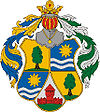Balatonföldvár
|
Balatonföldvár Földwahr |
||
|---|---|---|
| Town | ||

Sailingships in the Port of Balatonföldvár
|
||
|
||
| Nickname(s): Flowery town of Lake Balaton, Queen of Balaton | ||
| Location of Balatonföldvár | ||
| Coordinates: 46°51′17″N 17°53′17″E / 46.85469°N 17.88797°ECoordinates: 46°51′17″N 17°53′17″E / 46.85469°N 17.88797°E | ||
| Country |
|
|
| Region | Southern Transdanubia | |
| County | Somogy | |
| Settled | 14th century | |
| Incorporated | 1893 | |
| Government | ||
| • Mayor | Huba Holovits | |
| Area | ||
| • Total | 15.32 km2 (5.92 sq mi) | |
| Highest elevation | 208.2 m (683.1 ft) | |
| Lowest elevation | 104 m (341 ft) | |
| Population (2004) | ||
| • Total | 2,093 | |
| • Density | 136.61/km2 (353.8/sq mi) | |
| Demonym(s) | földvári | |
| Time zone | CET (UTC+1) | |
| • Summer (DST) | CEST (UTC+2) | |
| Postal code | 8623 | |
| Area code(s) | 84 | |
| Website | balatonfoldvar.hu | |
Balatonföldvár (in German Földwahr) is a popular resort town in Somogy, Hungary on the southern side of Lake Balaton, approximately 120 km southwest from Budapest and about 23 km southwest from Siófok, the "capital of Balaton". Balatonföldvár is a frequently visited tourist destination among Hungarians and foreign guests (especially Germans and Austrians) because of its natural beauties (like the loess hill and the big flowery parks), historical heritages (like the celtic path, the old mansions and villas) or its countless leisure opportunities. The town offer several water sport (sailing, windsurfing, fishing, rowing etc.) and mainland sport (beach volleyball, bicycle pathes, football etc.) activities.
The origin of the name Balatonföldvár is from Lake Balaton, the lake bordering the town, and the földvár (in English earth castle). The földvár was built in the late Iron Age, during the occupation of the Celts. The well-preserved trenches and mounds of this structure are clearly visible on the magaspart (in English high shore, the area above the cliff).
The town is commonly referred to by locals simply as Földvár.
In around the 4th century AD, the area was settled by Celts, who constructed the large Iron Age hill fort that gives Balatonföldvár its name, the remains of which are still visible today.
...
Wikipedia


